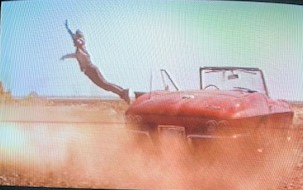|
creativity as the tawdry, the gaudy, the vulgar
Allow me to offer a few more words on the “Gordon Gekko” approach to art and creativity.
This merchandising and unrealistic view of creativity is promoted in many aspects of unenlightened human endeavor. Here’s one lipstick-on-a-pig example that’s rankled me for years, featured in this film:

Don’t get me wrong, I actually liked this movie as I’m a Trekkie from way back; also, I'm a Chris Pine fan and have featured him elsewhere; even so, I must protest to a certain tortured philosophy of leadership aptitude promoted here. It’s hard to stomach.
whaaa-hoo and ain't it great
A ten year-old James Tiberius Kirk has stolen the family’s antique Corvette and is now joy-riding at speeds approaching 100 mph. In a whirlwind, he passes a footbound buddy and turns around to gloat. The intoxication building now, he not only ignores a hovercraft traffic cop, but barrels his way at breakneck velocity toward a dropoff cliff. But who is mindful of such trifles when one is a hero with nine lives?
In the midst of all this hubris and chaos, we find the lad, now thoroughly besotted with animal spirits, shouting “whaaa-hoo” at both high decible and regular interval, indicating that devil-may-care dangers are “fun.”
Some years later we find an older teen, James T., continuing his bacchanal lifestyle. He drinks a lot, he lives a nomadic lifestyle, he smirks, he’s a swashbuckling loud mouth, he laughs at his own jokes, he wants to fight six goons all at once because he’s such a tuff guy.
One day, however, Kirk is interrupted by a scout from Star Fleet Academy who knows talent when he sees it. He encourages young n'er-do-well to apply to the officers’ training corp because who could doubt that he’s “captain material” just waiting to be harvested. And during the years of study, Kirk, true to form, makes a reputation for himself of flouting authority and breaking the rules because that’s just how really creative people think and live, don’t you know.
|
“Bravery without forethought causes a man to fight blindly and desperately like a mad bull. Such an opponent, must not be encountered with brute force, but may be lured into an ambush and slain... Pretend inferiority and encourage his arrogance... If your opponent is of choleric temper, seek to irritate him [causing him to reveal himself]... recklessness leads to destruction... show your dispositions and your condition will become patent, which leads to defeat..."
Sun Tzu, The Art Of War
|
All of this grandstanding is meant to not-so-subtly foreshadow the coming of a great starship captain. Why, it's so obvious to anyone that this boy is Pericles reborn, just about to hatch now.
script-writers who create characters like this have no idea what true leadership is or how high-grade creativity works
With scripts like this, we can hardly make it to the waste basket in time or to the editor's red marker.
Would you really want, in a military confrontation, to be led by a theatrical commanding officer who thinks that shouting “whaaa-hoo,” that “danger is fun,” become the marks of skillful leadership?
The truly great military strategists of history were thoughtful men, often quiet and pondering, agonizing over any material decision. Think of Spruance before the Battle of Midway, or Eisenhower approaching June 6, 1944, or Wellington that early morning in Belgium. Each of these theaters of war, the miscalculation concerning which, might plunge civilization into a new Dark Age. Imagine these commanders, if they were of the sort, to be singing and boasting and high-fiving. We might not be here today. So much for the air-head “whaaa-hoo” and the "fun."
formless, mysterious, soundless
The great philosopher-generals of history speak of primary preparation for battle in terms of cleansing one’s own spirit, of piercing introspection, of winnowing solitude. Consider these excerpts from Sun Tzu's "Art Of War", 500 BC:
“If you know the enemy and know yourself, you need not fear the result of a hundred battles. If you know yourself but not the enemy, for every victory gained you will also suffer a defeat. If you know neither the enemy nor yourself, you will succumb in every battle.”
“Let your plans be dark and impenetrable as night, and when you move, fall like a thunderbolt.”
“Move swift as the Wind and closely-formed as the Wood. Attack like the Fire and be still as the Mountain.”
“Be extremely subtle even to the point of formlessness. Be extremely mysterious even to the point of soundlessness. Thereby you can be the director of the opponent's fate.”
It is extremely interesting that Bruce Lee, probably the greatest martial artist in the last century, focused upon Sun Tzu’s instruction concerning making oneself “formless”:

"Empty your mind, be formless, shapeless, like water. Now you put water into a cup, it becomes the cup; you put water into a bottle, it becomes the bottle... Now water can flow or it can crash. Be water, my friend... When the opponent expands, I contract, when he contracts, I expand, and when there is an opportunity, I do not hit, it hits all by itself... [Success is] not being tense, but ready... not being set, but flexible, liberation from the uneasy sense of confinement. It is being wholly and quietly alive, aware and alert, ready for whatever may come."
Authentic leadership, as with all forms of highest-grade creativity, centers upon stilling the mind, accessing an inner wisdom, an elevated level of consciousness. This makes no sense to those who believe that getting ahead is "who you know," playing the Hollywood-high-school sensationalist, canvassing to be noticed, and shouting “whaaa-hoo.”
Actually, though, we’ve sort of heard of this wariness of flashiness all of our lives, haven’t we -- remember how they used to say, “It’s the thinkers, the quiet ones, the ones who don’t say much, that you have to look out for.”
|











